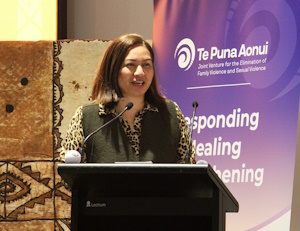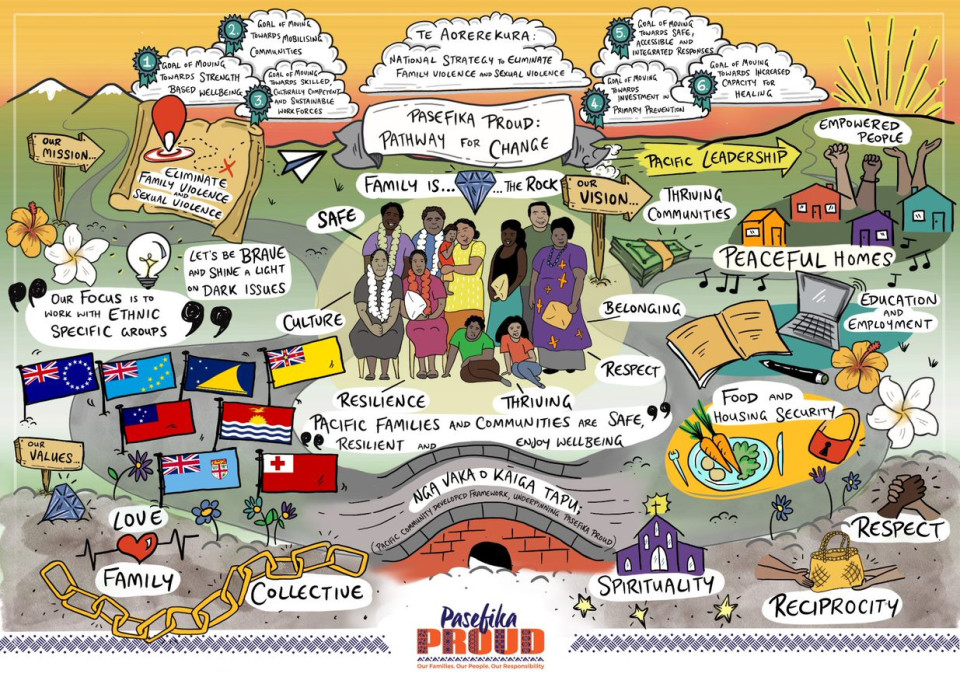A change 180 years in the making
The Minister for the Prevention of Family and Sexual Violence, The Hon. Marama Davidson, represented the Government at the Fono and she covered the theme of weaving knowledge and actions together in relation to the Te Aorerekura Strategy.
Ms Davidson told a receptive audience that it was an honour to be seated at the table with people she described as ‘’incredible heroes’’ which included ‘’many, many Pacific champions’’.
 She said that Polynesian and Pasefika cultures were a collective that understood that no individual reached places of privilege in service without the support and guidance of the community.
She said that Polynesian and Pasefika cultures were a collective that understood that no individual reached places of privilege in service without the support and guidance of the community.
As a Minister of the Crown, she said there was a duty and responsibility on Crown structures and systems to ensure they were confirming the voices, leadership, expertise, and cultural ways that were the strength of the work being done to heal and prevent violence in the community. The work of Te Aorerekura, the strategy to eliminate family and sexual violence, was to affirm the power the community already had. ‘’Not just with words, not just with the strategy, but with the authority, the mana, the power, and the resources,’’ she said.
Ms Davidson emphasised, ‘’We have got a lot more work to do to correct long standing imbalances, long standing discrimination, long standing inherent racism and classism across all of our systems. As Tangata Whenua I stand here to acknowledge that many of the same challenges, many of the same deeply built-in systemic barriers to doing the work and to the perpetual harm that has happened to our communities require an accountability that must come from Government, not just to acknowledge those challenges, but to commit to changing them.’’
She accepts that she has a ‘’unique role and responsibility’’ as the Minister to make sure that the expertise, knowledge and long-standing work and strengths of cultural understanding, which come from the Fono participants’ strength of whakapapa are leading and helping Te Aorerekura to be better.
Ms Davidson noted that, when Te Aorerekura was launched, the purpose was to open up on where they had gone wrong, and to create the space for communities to mobilise, to lead their Mahi, and to ensure that government worked its own backyard out, that Government agencies talked to each other and collaborated properly and that agencies realised that it was at the community and whanau level that work had to be focussed.
‘’The Government has to set up the scaffolding to change how we have worked, to allow the long journey of this task to happen. That always troubles me slightly as I want the violence to end now, but the reality is this requires long effort because it has to be healed intergenerationally,’’ the Minister said.
'’In the colonial and colonised context of Aotearoa we have survived through 180 years of intergenerational violence, driven by the forces of colonisation and the patriarchy of a system that was never ours. So, we have allowed ourselves a generation, through Te Aorerekura, to heal that.”
“When I put it in those terms, I am able to keep going, because we can either have another 200 years of intergenerational violence or we can make sure we are healing the next generation so that no future mokopuna have to tolerate and survive but can actually thrive.’’
Ms Davidson believes that the perception that, for too long, the Government in Wellington was disconnected from the grass roots communities, is ‘’absolutely correct’’ and it is now time to change how Government works.
‘’We are putting down roots ... to change how we work, now that what we are doing is relationship-based, and trust-based. For too long we have undermined the expertise, the lived experience and knowledge of our Pacific communities, and that is why we have not been able to interrupt the generations and the cycles of harm.’’
Ms Davidson went on to say that the systems in place, decades, and generations intrenched, were not succeeding in the work they were supposed to do. It is now time to unwind that method and turn to a way based on relationships and to understand how to work together as Crown, NGOs, and whanau. ‘’Yes, it requires an entire culture mindshift at Government level, but I am proud to be at the forefront of that work,’’ she said.
‘’Te Aorerekura – is a strategy we have never seen, even getting all the people involved to agree on a starting point to do this work, but it all comes back to one main principal - to affirm the community leadership, to completely turn upside down the power and where it has been located.
‘’The magnitude of that work can keep me awake at night,” said Ms Davidson, “But then I come into a room like this, full of joy and hope and connection ... finally realising that this is the way these colonial systems should have been operating from the very start and that it can be overshadowed by the aroha of our indigenous leadership.’’
HOW PASEFIKA PROUD FITS WITHIN TE AOREREKURA NATIONAL STRATEGY TO ELIMINATE FAMILY VIOLENCE AND SEXUAL VIOLENCE
